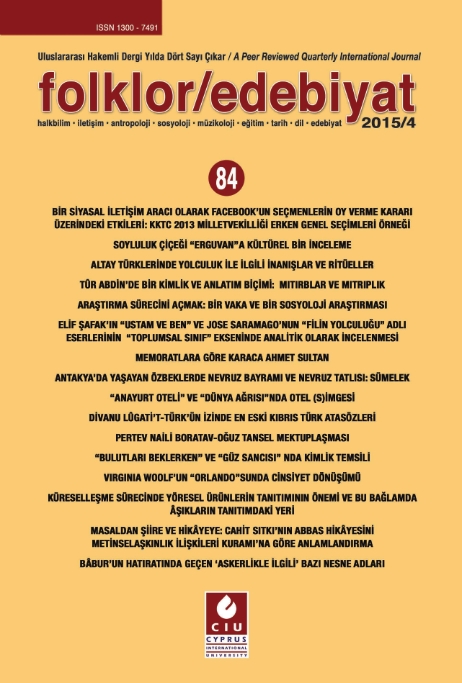“Anayurt Oteli” Ve “Dünya Ağrisi”Nda Otel (S)İmgesi
“Anayurt Oteli” and the Symbol-Image of Hotel in “Dünya Ağrısı”
Author(s): Mehmet BaştürkSubject(s): Cultural history, Novel, Turkish Literature
Published by: Uluslararası Kıbrıs Üniversitesi
Keywords: Yusuf Atılgan; Anayurt Oteli; Ayfer Tunç; Dünya Ağrısı; Hotel;
Summary/Abstract: The novel owes its popularity as a literary type in modern times to its explaining and discussing the person and society reality with its all aspects in detail. In novels where every status of the person and the society is reflected, one of the indispensable basic elements of the fiction is “place”. Place doesn’t confront us just as a scene element in narrations. With its various functions, symbolic value, it may be one of the narration heroes carrying the thematic power on itself. Readers and researchers can follow the human and society’s progress in history and their later journey from the places in the works. In this regard, one of the important symbolical places in society-time-place mechanism is “hotel”. The access of hotel to our novels is the result of the fact of urbanisation in modern times. Hotels are handled with their symbolical connotations like loneliness, homelessness, statelessness, temporariness, rootlessness, state of disidentification. In the place typology of the times after modernisation, the hotels which take part in the list of absent places become the places of consumption and pleasure besides being the symbol of the values which are mentioned. In this work, heading from the information mentioned, Yusuf Atılgan’s work “Anayurt Oteli” (1973) and Ayfer Tunç’s work named “Dünya Ağrısı” (2014) are examined around the symbol and image of “hotel” with analysis and comparison method. The hotels in the works are tried to be analysed under the titles of “hero of the novel”, “land of the landlessness”, “the one making preventer” and “compulsory shelter”. As a conclusion, in both works, “hotel” doesn’t take part just as a scene element. It becomes an important part of the fiction with its various functions.
Journal: Folklor/Edebiyat
- Issue Year: 21/2015
- Issue No: 84
- Page Range: 131-144
- Page Count: 14
- Language: Turkish

